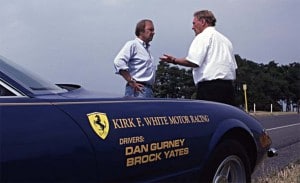
He was funny and charming, the consummate automotive raconteur. But that wit could also be razor sharp, and Brock Yates was never afraid to use it on a bloviated target, which is one reason he came to be known as the “Assassin.”
So, it was all the more tragic to friends and colleagues who watched the author, journalist, screen writer and racer steadily fade to dark under the ravages of Alzheimer’s, ultimately passing away on October 5, just weeks short of his 83rd birthday.

It’s not easy to say what Brock Yates was best known for, as he was accomplished in so many areas. It probably depends upon when you first heard his name, read one of his works, or caught one of the movies he wrote or at least influenced. For many, Yates was most closely associated with the film, “The Cannonball Run,” which was loosely based on the mad, “Sea to Shining Sea Memorial Trophy Dash” he created.
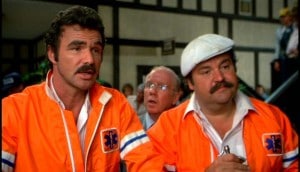
The rules were simple to the point of anarchic, “All competitors will drive any vehicle of their choosing, over any route, at any speed they judge practical, between the starting point and destination. The competitor finishing with the lowest elapsed time is the winner.”
Was it a coincidence that Yates and driving partner Dan Gurney won the first race, making the trek from New York to Los Angeles in a mere 35 hours, 53 minutes driving a deep blue Ferrari 365 GTB/4 Daytona?
In all, there were five Cannonballs, followed by an ongoing series of only slightly less lawless events, dubbed One Lap of America.
The Cannonball inspired three movies, Yates writing the screenplay for the first, which hit the silver screen in 1981 and was directed by long-time friend and stuntman Hal Needham. Brock’s 15 minutes of Hollywood stardom – actually more like 15 seconds – came in a cameo at the beginning of the first film, laying out the rules as the race organizer.
It may have provided plenty of meat and potatoes, but film really wasn’t Brock Yates métier. He was the classic automotive journalist, shining in an era of print, when magazines like Car & Driver attracted a legion of fans and strongly influenced the industry itself.
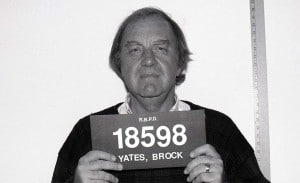
“He was a very, very inventive writer,” said Tony Swan, a long-time Yates colleague and sometimes editor. “His stuff was always fun to read, and he was prolific. The amount of stories and books he wrote was just astounding.”
In a tribute to Brock in C&D, writer Davey Johnson highlights an excerpt from Yates’ 1972 book, Sunday Driver. ““So you fly across the United States and stand around in the open portals of the Ontario, California, airport, in there with the lean, watery-eyed nouveau-hillbillies who increasingly dominate the Golden State’s destiny . . . and if you look taciturn enough, people will sure as hell think you are a race driver.”
Like many automotive enthusiasts, Yates was not a fan of bureaucrats, nor of those who would take the fun out of driving in the name of safety and the environment. He could be especially vicious when taking on the likes of Ralph Nader. But he could be equally tough on the auto industry itself. He reportedly took on the nickname, Assassin after tearing apart Detroit’s Big Three in a piece titled, “The Grosse Pointe Myopians.” Years before the first energy crisis, he knew the Japanese were coming.
Yates loved the nickname, but a more appropriate title might have been “automotive Libertarian.”
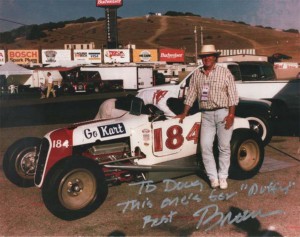
(Ralph Nader one of four inducted into Automotive Hall of Fame. Click Here for the story.)
No one ever counted all the various tickets – and occasional arrests – Yates racked up in the name of motoring freedom. Nor is there a clear count of all the vehicles that were left on the side of the road. That included one new Dodge that had its radiator punctured during a close encounter with a bull in Mexico, where Yates was part of a team of C&D writers off on assignment.
Swan recalls how Yates also borrowed a Mustang from Ford, the automaker thinking he was going to take it out for a review. He was – but not until he entered it into a Trans Am race then turning it back, “thoroughly trashed.”
The tributes have being pouring in since word of Brock Yates’ passing was announced. Long-time colleague Doug Stokes wrote that, “Brock Yates gave voice to the excitement and frustrations of the wheeled world, he managed to be civil on many occasions, even charming at times, but he was always at his best asking the tough questions.”
Being an enthusiast and yet not a shill for the auto industry is a rare skill and a much-needed one.
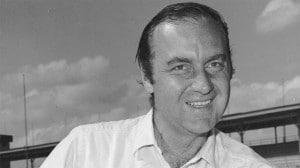
But it has been a decade since Yates first started showing signs of the illness that would ultimately take his life. Editors recall how he would call to discuss a story or assignment and then call back with the same questions 15 minutes later. By the beginning of the decade, as his public appearances became steadily fewer, it was clear that Yates himself knew what was being taken from him. But even as his memory faded into the fog, his wit hung on.
And he wrote as long as possible, at the end, with the help of his daughter.
There have been many good automotive journalists, even a few great ones. Most names fade into their own fog over time, but whether through his books, his columns, the movies he wrote or inspired – or simply because of the endless tales that can be told about him, Brock Yates is likely to remain a larger-than-life figure for a long time to come.
(A life well lived. Click Here for our tribute to the late Denise McCluggage.)








Paul,
Nice tribute to my good friend Brock. I’ve missed him these last few years, as the disease took its toll. He was much more than most people know. Not just a raconteur, but a true rennaissance man, and great human being.
Chris Theodore